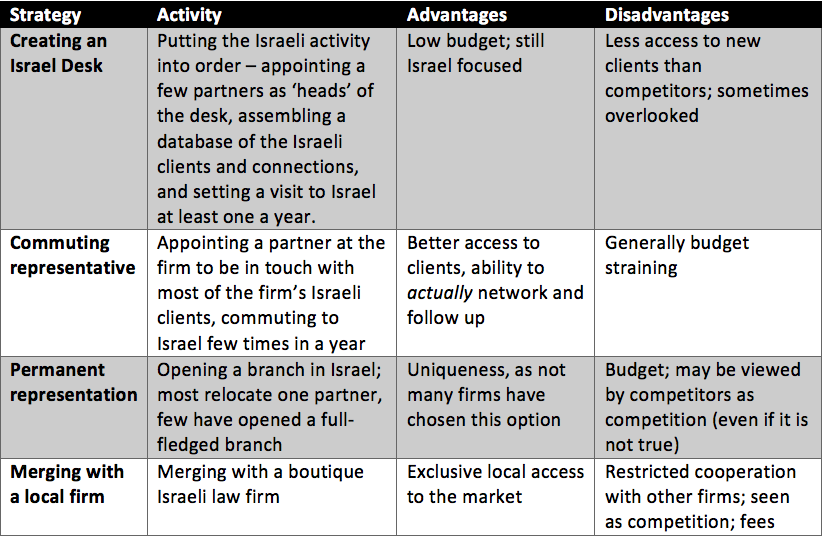** This article is taken from the Legal Business World 2018 No. 1 e-magazine, published in early 2018; the full article can be seen here: http://www.lbw2018us1.legalbusinesslibrary.com/index-h5.html?page=1#page=27
Israel’s like to joke that it is not worth physically expressing impatience toward another vehicle in a large traffic jam, because as statistics have it, you are likely to “get served” afterward.
And why? Israel holds over 70,000 registered attorneys, with a population of eight million. That is roughly one attorney for every 114 people – the highest number of attorneys per capita in the world, by far.
The saturation of the Israeli legal market is what brought the boom of legal marketing within the Israeli legal market over the past five years. Law firms can no longer rely on fishing clients through word of mouth nor rely on their logo and reputation to retain existing clients. In result, some firms are in complete denial that the market is changing, some are moving with the market and investing in technology solutions within their firms and some uphold the status-quo hoping they will survive.
If this situation is hard to believe, globalization had things more complicated – or at least should we say – interesting. After a relatively difficult struggle, the Israeli parliament amended a legislation back in 2012, allowing international law firms and attorneys to formally practice law in Israel. This act officially opened up the already internationally oriented Israeli business and legal market to the massive legal markets of the US, EU and the Far East.
Today, nearly six years later, there are over 90 (!) international law firms currently active in Israel, law firms from all across the globe.
With saturated local and international legal markets in Israel, how can international law firm find worthwhile and feasible opportunities in a country the size of Rhode Island? The answer divided as tri-fold: know your goal, do not be afraid to take a “leap of faith”, and understand the local market (or hire someone that does).
(1) Know your goal
The Israeli business market is fascinating, popular and exciting. The numbers speak for themselves. There are 94 Israeli companies on NASDAQ, with a $70 billion market cap. Israel has the largest number of start-up companies per capita in the world.
In absolute terms, Israel’s 3,000 start-ups are the largest centration worldwide (after Silicon Valley). There were 104 Israel tech exit deals worth $10 billion, only in 2016. Foreign investors total investments amount of $11.1 billion in 2016. There are nearly 300 foreign R&D centers in Israel. And – among others – Israel was ranked as one of the eight great powers of 2017 by the American Interest magazine, alongside the US, China, Japan, Russia, Germany and others
Even though these numbers are objectively impressive, they can be blinding, similar to the first few months of a new relationship. International law firms that want to expand their activity to the Israeli legal market, sometimes so excited to enter the market that they forget to write down their goals.
Goals allow the firm to focus on the right and relevant networks within the country. The most popular goal is the following: “my firm would like to expand our network so that when their next case involves a legal dispute in my country, they will call my firm” Other goals can include broadening the firm’s brand within Israel, or staying in constant contact with current connections by sending out quarterly newsletters and holding annual conferences in Israel or wanting to dominate certain practice fields.
Firms that do not define their goal ahead of time, find themselves lost within the complicated and saturated Israeli legal market – with only a few “successful meetings” and at least, some good weather… Therefore, regardless of the goal, whether realistic or not, it needs to be defined in order to allocate the necessary resources and streamline their use when it comes does to the money time.
(2) Do not be afraid to take a “leap of faith”
Speaking of resources and their allocation – this is one of the most sensitive steps for international law firms in general. Inevitably, many of the “silver circle” and “magic circle” firms around the world hold such complicated bureaucratic internal systems, that allocating the minimal resources necessary to take the first few steps can be difficult. However, the only way to become a significant player within the market is by taking a “leap of faith”.
Grab a few partners who represent Israeli clients or has Israeli connections (even low-level ones), put them on a plane and organize a week of meetings. Then do it again six months later. And if you are really serious – once again six months later, but following an event put on by the firm in Tel Aviv exploiting the firms’ expertise in a certain practice field. Although the budget constraints may not necessarily overcome the benefits during the first few visits, understanding and utilizing the market’s opportunities – require patience and consistency by the law firms. Building the firm’s network and standing out next to the tens of American / British / European firms lining up the top 20 law firms of the Israeli market – takes time.
(3) Understand the local market
One of the keys to utilize the countless amounts of opportunities for international law firms in Israel, is to understand the local market. Really understand it. Now of course, this is a nearly impossible feat for firms coming from around the world. Most Israeli’s do not even understand the Israeli market. However, this is essential. Spend the time in trying to navigate the firm’s way, which firms are actually relevant to meet, what conferences will grant invaluable access and exposure and what the market is really looking for when looking abroad.
What happens if the firm does not understand the market? We have seen this many times, unfortunately. Hoping their brand and reputation will follow them from New York or London to Tel Aviv, firms soon realize (tens of thousands of dollars later) that not only they did not reach the right people, but they might have even made a negative impact during their stay in Israel.
One of the best ways to succeed on this point is use someone local who knows their way around the market. A contact or organization who knows how to connect the firm’s representatives to the relevant partners and the relevant law firms. Just as you would take a guide throughout the Tanzanian safari, take someone local to navigate you through the Israeli market.
The following is a short summary for the different ways in which international firms have found their way into the Israeli market:

In addition to the different strategies various international law firms have taken within the Israeli market, there are a few other points that must be addressed in order to receive a holistic understanding of the Israeli legal market.
First – fees. An Israeli attorney does not work shorter hours than their European or American counterpart. Nor are they less competent or worthy, they are just paid less. Much less. Generally, an Israeli managing partner at one of the top 10 firms will charge a similar fee to an American or European senior associate. For some associates and partners, charging $300 an hour is not too bad of a deal.
Dun and Bradstreet’s (D&B) annual research on the Israeli legal and business sector shows that the number one complaint that Israeli clients have against their attorneys are the fees. Talk about a tough crowd… Therefore, international firms cannot be surprised when Israeli clients will have difficulty paying the New York or London average hourly fees.
Second – Israel is culturally unique. In 1971, two researchers clustered all of the cultures of the world into groups, however there were four countries that they just couldn’t group with anyone else – Brazil, India, Japan and Israel. Moreover, the nickname for those born and raised in Israel are called “Sabra’s”, the fruit that grows on cacti. The explanation is simple – they are rough around the edges but sweet inside. Crack pass the hard, sometimes aggressive shell, and you will find out just how sweet the inside is. What are we trying to say? Do not be surprised when Israeli’s are a bit more straightforward, it is normal. Oh, and lose the tie! The only ones wearing them are judges and grooms-to-be.
So, how can an international law firm practically find opportunities in Israel?
As mentioned, the Israeli market is overflowing with fascinating topics and practice fields. Initially, focus on one or two practice fields. Yes, even the “magic circle” firms, the one-stop-shop firms, must strategically concentrate. If there are too many low hanging fruit, none will be caught.
Recently, the “hot” topics have sparked impressive international legal work include:
- Natural oil and gas – the discovery of offshore natural gas and oil are turning Israeli into a worldwide energy exporter and expert.
- Cybersecurity – Israel’s decision to support the rise of a domestic cybersecurity and IT economy has placed it at the epicenter of the ongoing revolution in military power based on information control and management; attracting private investors and international state funding by India, China and Russia.
- Startup ecosystem – Tel Aviv was ranked by Startup Genome’s 2017 Global Startup Ecosystem Report as the 6th best startup ecosystem in the world, with 250 Israeli companies going public on NASDAQ over the last 40 years and having listed more companies on NASDAQ than any other country besides the United States and China.
- Agriculture, food and digital health industries – these fields have reeled in an endless list of investors, with the latter increasing by nearly 30% in 2016.
- R&D Centers – Israel has more researchers per capita working in R&D than any other country worldwide, and venture-capital investment per person is the highest in the world.
Once picking a practice field, get on a plane! When scheduling meetings, branch out of the “usual suspects”. It is important to meet the top tier Israeli law firms in Legal 500, however, the Israeli market is filled with high quality boutique firms – meet with them as well, especially because the chances of getting work referred from them can more times than not be higher.
After a week of fascinating meetings, great weather and maybe even an interesting conference or two, the work has just begun. Find a way to stay in touch with your new connections. Connect on LinkedIn, create a quarterly newsletter that discusses the firm’s Israeli activity and add them to the distribution list, and update them you would be happy to meet during your next visit in Israel – no later than six months following the previous visit. Now repeat. Israeli culture is heavily based on personal relations, making the schlep of revising clients and contact completely essential.
To make a long story short, the Israeli market is upbeat, fascinating and filled with opportunities. On the other hand, the Israeli market can also be deceiving. It requires its newbies to prioritize, know their goals, take a “leap of faith”, and try to navigate the market until they feel comfortable. Our best piece of advice? Give it a chance. How bad can it be – the weather is great, the food is incredible and Tel Aviv has been dubbed one of the happiest cities in the world. See you soon in Israel.
- Tamar Sacerdoti manages the International Department at Robus Legal Marketing






